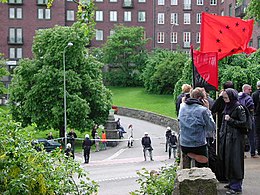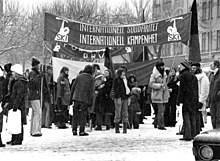Anarchism in Sweden
As with the movements in Germany and the Netherlands, Swedish anarchism had a strong syndicalist tendency,[1] which culminated in the establishment of the Central Organisation of the Workers of Sweden (SAC) following an aborted general strike.
[2] Following the defeat of the Great Strike of 1909, a number of Young Socialists participated in the foundation of an anarcho-syndicalist trade union, the Sveriges Arbetares Centralorganisation (SAC).
[4] During World War I, the SAC received support from the German syndicalist Augustin Souchy, while in the United States, the Swedish labor organizer Joe Hill was executed.
[2][5] The Swedish anarchist movement experienced a resurgence as a result of the protests of 1968, although by this time the Young Socialist Party had ceased to exist.
Further attempts to rekindle a national organisation were largely short-lived, with anarchist presence instead taking root in the rising counterculture of the 1970s, particularly within the punk subculture and nascent intentional communities.

